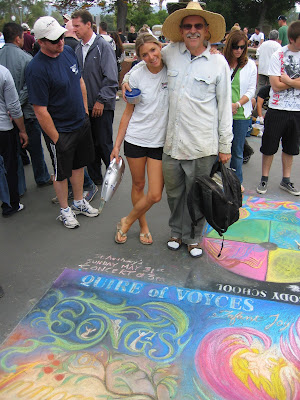

Here's Dave and daughter helping us represent at I Madonnari this year
JOSEF WOODARD, NEWS-PRESS CORRESPONDENT
| |
June 3, 2009 7:34 AM
Picking up where it was forced to leave off, Quire of Voyces capped its season Sunday afternoon in a beautiful, resolving fashion at St. Anthony's Seminary chapel. Originally scheduled a few weekends back, this rich concert program was one of several cultural events in town cancelled or postponed because of the Jesusita Fire.
Under the circumstances, the performance gained a certain ceremonial air, something akin to a resilient afterglow from the burn. An assemblage of candles in the performance area took on a perhaps unexpected symbolism.
Sunday's program proved to be a neat balance of material. All-important nods to the English Renaissance mastery of William Byrd and Thomas Tallis -- a specialty of this group -- mixed with the early 20th century British stuff of Ralph Vaughan Williams' 1922 "O vos omnes" and composer-organist William Henry Harris' choral maze "Faire is the heaven" to close the concert.
Not incidentally, the group performed three pieces by living composers, including John Tavener, Irish choral figure Michael McGlynn and the Quire's composer-in-residence, Michael Eglin, via a world premiere of "Five Songs of William Blake."
In a sense, Mr. Eglin's new piece was the de facto centerpiece. While leaning toward traditional musical vocabulary in these song settings, Mr. Eglin cues off the delicate mixture of mysticism and earthiness in Blake's writing.
Handsome features rise from the overall structure of his songs. "Hear the voice of the Bard" pares down to a slow, mournful final verse, and "Cradle Song" is a lullaby-like passage of sweetness amid darker turns in other songs. On the final song, "Night," Mr. Eglin's writing evolves with each new stanza and poetic sentiment. Led with typical boldness and subtlety by director Nathan Kreitzer, the choir put forth a luminous first performance of Mr. Eglin's ambitious creation.
Tavener, the British composer famed for his inspired melding of ancient choral tradition and modern, quasi-minimalist styles, supplied the concert's opener, the 1985 "Hymn to the Mother of God," written in memory of his late mother. The brief, beguiling piece involves a slightly mind-altering effect, with a simple hymn set into a polytonal drift by setting groups of singers out of phase with each other.
Further intrigue entered the picture in the works "Lux aeterna" and "The Road of Passage," by Mr. McGlynn, whose claims to fame include the populist "River Dance" and also more serious efforts in the choral music world. This music came from the latter region of his musical life, although he often finds ways to incorporate Irish folk music qualities and new age-ish flavors into his music.
Mr. McGlynn also shows an obvious fascination with pure sonic splendor in the unique forum of choral music, spinning out haunting chords and voice blends that enchant on their own terms, regardless of the compositional housing.
From a local's standpoint, those ethereal choral effects seemed to gain extra expressivity in this inspired and resonant chapel setting, flecked by candlelight in a city thankful the latest fire's ravages weren't any worse.